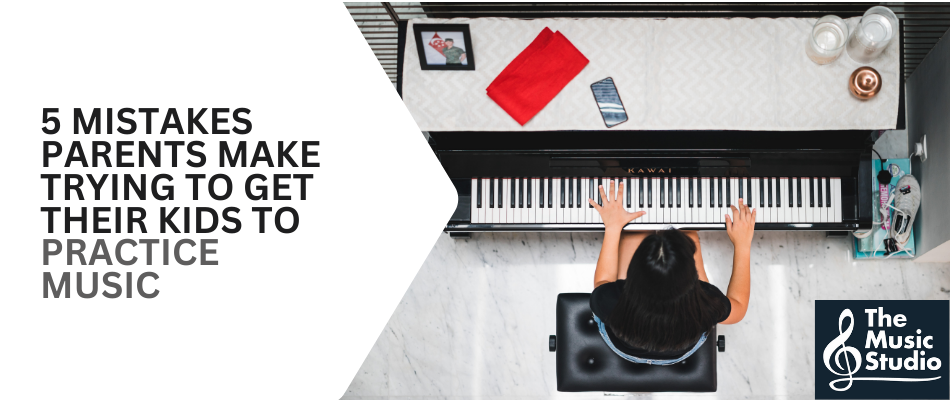So, you’re dutifully paying for weekly music lessons, but your child’s instrument tends to sit in the corner, collecting dust during most of the days in between. But why? If your child refuses to practice music at home, or if those practice sessions end in your frustration and your child’s tears, take some comfort in the knowledge that you’re not alone.
Practicing an instrument is a lot of work at times – tedious even. And children don’t always see immediate improvement from their practicing, which can make it seem pointless. But you know practice isn’t pointless. Time spent with their instrument every day can lead to a consistent level of improvement in foundational skills, as well as character traits like persistence, patience, and perseverance.
If you’re struggling to get your child to enjoy practicing daily, you may be approaching it the wrong way. For that reason, this week we’re exploring the top 5 mistakes that so many well-meaning parents make, and what you can do instead to encourage them.
Mistake #1: Choosing the Instrument or Musical Style for Them
It’s not hard to understand that kids are more likely to enjoy their musical experience if they can choose their own instrument and musical style. You may have had dreams of playing piano duets with them, but if they are more interested in the saxophone or trumpet, let them try it out. The same holds true for musical styles; your blues-loving daughter might never like classical flute. So, let her explore her own interests! When you encourage your child to make their own musical choices they will be more likely to welcome practice and to develop a love of music in general.
Mistake #2: Not Scheduling Practice Time
It’s a great idea to schedule practice time into the family calendar. Just like homework, practicing music shows the greatest results when done on a daily basis. In fact, most teachers recommend a bare minimum of 15 to 30 minutes of practice every day. This is especially true for students who are just starting out. Without a scheduled time built into the family calendar, practice is an easy thing to push out of the day entirely. And on this note, don’t let your child convince you that band practice at school counts as their practice time; practicing solo at home is the key to improving and seeing real results.
Mistake #3: You’re too Rigid
With all that strict, daily practice scheduling, it’s also important to stay flexible and read your child. If they seem to be struggling to concentrate during their practice time or seem to be extra frustrated, take a moment to assess the situation. Do they need a break and some outside play? Maybe a snack will help their concentration? Overall, you want the practice to be a good experience; if that time ends in tears and screaming regularly, your child will end up hating their musical instrument.
Mistake #4: You Stick Around Too Much
The time kids take to practice music is not a great time for you to sit and watch over them. Just like with their homework, you’ll want to be at the ready should they need help, or just to stay in touch with their experience, but you need to allow them to work independently.
Let them know they’re doing a great job when you hear something good or when you know they’re working hard. Encourage them to keep trying when you feel them getting frustrated. But unless they actually need help, let them practice on their own. You know your kids best – if they like to work independently, let them. But on the other hand, if they require a more hands-on approach, don’t be afraid to give it.
Mistake #5: There Isn’t a Consequence to Not Practicing
While you’re trying to have both a schedule and be flexible, daily practice should also be something that isn’t optional in your home. As such, there should be consequences for skipping a practice session. Try establishing a family routine that includes both homework and music practice before any “screen time” is allowed. If you’re not sure if your child is practicing like they should be, their music instructor will be able to tell. Make sure that you talk about and share your expectations with both your child and their instructor. That way everyone is on the same page and working towards the same goal.
Remember: You Need to Practice Your Patience, Too
When your child tries to resist practicing their instrument at home, try to keep your own frustration in check. Some push-back from kids is normal and should be expected. That said, with only a few small additions to your family schedule, as well as some small changes to your practice-time philosophy and strategy, you should be able to lower the levels of complaining within a few short weeks. Even better, your child will start to see the slow and steady results after consistent daily practice sessions. This will help them continue to grow as a musician and will benefit them in the music world, wherever they go with it.
No matter what style of instrument or musical genre your children are interested in, or even what age or skill level they’re at, there’s a program for them here at The Music Studio! If they’re into rock n’ roll, we’ve got Kidzrock and Jr Rockers for the little ones, and Junior Rock Band, and Youth Rock Band for kids a little older. We’ve also got jazz, pop, choir, and more – even a bunch of programs for adults – music has no age limit, after all! Check out all our programs, classes, and lessons, and you’ll be sure to find something that is perfect for your children – or even you! It’s never too late to start down the path to music!




